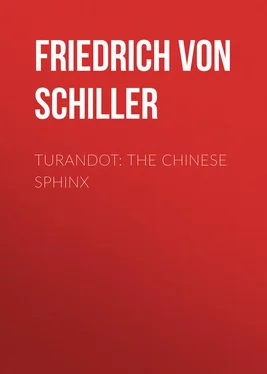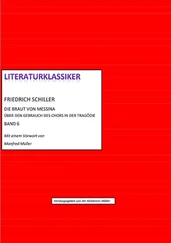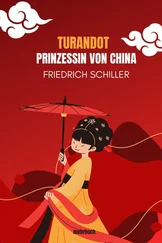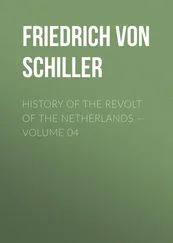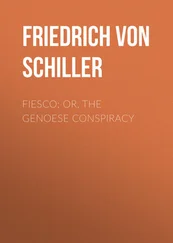Friedrich Schiller - Turandot - The Chinese Sphinx
Здесь есть возможность читать онлайн «Friedrich Schiller - Turandot - The Chinese Sphinx» — ознакомительный отрывок электронной книги совершенно бесплатно, а после прочтения отрывка купить полную версию. В некоторых случаях можно слушать аудио, скачать через торрент в формате fb2 и присутствует краткое содержание. Жанр: literature_18, foreign_antique, foreign_prose, на английском языке. Описание произведения, (предисловие) а так же отзывы посетителей доступны на портале библиотеки ЛибКат.
- Название:Turandot: The Chinese Sphinx
- Автор:
- Жанр:
- Год:неизвестен
- ISBN:нет данных
- Рейтинг книги:4 / 5. Голосов: 1
-
Избранное:Добавить в избранное
- Отзывы:
-
Ваша оценка:
- 80
- 1
- 2
- 3
- 4
- 5
Turandot: The Chinese Sphinx: краткое содержание, описание и аннотация
Предлагаем к чтению аннотацию, описание, краткое содержание или предисловие (зависит от того, что написал сам автор книги «Turandot: The Chinese Sphinx»). Если вы не нашли необходимую информацию о книге — напишите в комментариях, мы постараемся отыскать её.
Turandot: The Chinese Sphinx — читать онлайн ознакомительный отрывок
Ниже представлен текст книги, разбитый по страницам. Система сохранения места последней прочитанной страницы, позволяет с удобством читать онлайн бесплатно книгу «Turandot: The Chinese Sphinx», без необходимости каждый раз заново искать на чём Вы остановились. Поставьте закладку, и сможете в любой момент перейти на страницу, на которой закончили чтение.
Интервал:
Закладка:
Friedrich Schiller
Turandot: The Chinese Sphinx
Personages
ALTOUM, Khan of the Celestial Empire.
PANTALOON, his Prime Minister.
TARTAGLIA, Lord Chancellor.
TRUFFALDIN, Keeper of the Hareem.
BRIGHELLA, Captain of the Imperial Black Guards.
KALAF, Prince of Tartary.
BARAK, his former Tutor.
ISHMAEL.
DOCTORS of THE DIVAN.
TURANDOT, Heiress to the Celestial throne: generally known as "The Chinese Sphinx."
SKIRINA, her attendant, wife to Barak.
ADELMA, Princess of Keicobad, slave to Turandot.
ACT I
The Gods be thanked, at last by patient seeking,
I've found a lodging in this crowded Peking.
(Enter BARAK, in Persian costume; sees KALAF and starts, surprised.)
Prince Kalaf? 'tis not possible. He's dead!
Yet, sure 'tis he – his eyes – his legs – his head, —
My Lord!
What – Barak! here – alive?
And kicking.
But how escaped you from that fatal licking
The Bey of Tefflis gave us all in battle?
Your father's troops were slaughtered off like cattle,
And you, my Prince, we thought, were slain or taken;
So off I fled to save, at least, my bacon.
I found a refuge in this queer old city;
A widow married me for love – or pity.
We live like happy doves in yonder cot, —
My only grief, – the thought of your sad lot.
We never thought to meet again, dear Tutor, —
In China too!
For years I've taken root here.
But, dearest Prince, how was it, tell me, pray,
You 'scaped the perils of that dreadful day?
Breathe not my name! A price is on my head;
I've roamed from land to land; have toiled for bread.
As slave I served the Shah of Keicobad;
This King a fair and gracious daughter had,
Who guessed my birth, and offered me her heart.
Her haughty father bade me quick depart;
With horse and arms he furnished me. I'm here
T' enlist myself as Chinese volunteer;
I hope to serve the Son of Moon and Stars
In some crack regiment of Light Hussars.
But what's the meaning of the crowds that flood
Each caravanserah? Refused I stood
By all, till in yon house I found, at least
Accommodation for myself and beast.
In that trim cottage lives my wife. 'Tis lucky
She proved herself in house-letting so plucky.
I give you joy, old friend; you're married snugly,
Your wife (for a Chinese) is not so ugly,
And kind as kind can be, though somewhat droll,
Adieu, – I'll through the city take a stroll.
And then proceed to visit the great Khan,
And beg him to engage me as his man.
Stay, Prince, how rash! – you do not know your danger:
'Tis evident to Peking you're a stranger.
To-day a horrid deed will be enacted, —
A cruel death, by Turandot exacted.
Have you not heard that Turandot the fair
Has filled this land with bloodshed and despair?
'Tis true I heard, in distant Keicobad,
Accounts of Turandot, so strange, so sad,
That I believed them false, – exaggerated.
'Twas said the Prince of Keicobad, ill-fated,
Had met his death by Turandot's command;
His father, in revenge, assailed this land,
But lost his life; my patroness, his daughter,
By chance escaped unhurt the gen'ral slaughter,
And slave was made to haughty Turandot:
All this I heard, but credited it not.
Too true is all you've heard through common rumour,
The Princess Turandot's ferocious humour
Has many princes caused to lose their life
In seeking to obtain her as a wife.
Her beauty is so wonderful, that all
As willing victims to her mandate fall;
In vain do various painters daily vie
To limn her rosy cheek, her flashing eye,
Her perfect form, and noble, easy grace,
Her flowing ebon locks and radiant face.
Her charms defy all portraiture: no hand
Can reproduce her air of sweet command.
Yet e'en such counterfeits, from foreign parts
Attract fresh suitors, – win all hearts.
But she, whose outward semblance thus appears
To be Love's temple, such fierce hatred bears
To all marital sway, or marriage tie,
That rather than submit to man, she'd die.
Great kings and princes, all have sued in vain,
One glance of love or pity to obtain.
In Keicobad I heard this oft-told tale,
But thought it paradoxical – and stale.
'Tis true. Her poor old father's in despair,
For China's throne is now without an heir;
He longs for her to wed some prince or other,
And not perplex him with continual bother.
He's of an age to live in peace and quiet,
And not be plagued with wars and civil riot;
He's tried all means his daughter's mind to soften,
Has often sternly threatened – coaxed as often;
Used prayers for such a monarch infra dig —
But all in vain; she's headstrong as a pig.
At length she said she'd make a compromise,
The Khan consented – (he's not over-wise!)
His artful daughter wheedled him to swear,
By great Fo-hi, that she should never wear
The hateful Hymeneal yoke, unless
Some suitor for her hand should rightly guess
Three difficult conundrums by herself composed:
But if the man who for her hand proposed
Should fail to solve her problems – then his pate
Should be struck off, and grace the city-gate.
Why, what a tigress must this Princess be!
I never heard such cruelty – Bless me!
Already kings and princes by the dozen
She's managed by her subtlety to cozen;
For she's so clever that she always diddles
The keenest wits by her confounding riddles.
As wife, decidedly I should decline her,
She's made of dragon-pattern stony China.
What fools her suitors are, their hearts to fix on
So termagant and bloodthirsty a vixen!
So fascinating is she, none withstand her,
All men for her do nothing but philander.
Behold on yonder gate the ghastly row
Of livid heads set up in dismal show.
All these belonged to men who dared to hope
With Turandot in subtlety to cope.
To-day a prince is led to execution,
Who failed to give her riddles due solution.
That is the reason of the noise you hear,
Pray go not to the town.
What should I fear?
Интервал:
Закладка:
Похожие книги на «Turandot: The Chinese Sphinx»
Представляем Вашему вниманию похожие книги на «Turandot: The Chinese Sphinx» списком для выбора. Мы отобрали схожую по названию и смыслу литературу в надежде предоставить читателям больше вариантов отыскать новые, интересные, ещё непрочитанные произведения.
Обсуждение, отзывы о книге «Turandot: The Chinese Sphinx» и просто собственные мнения читателей. Оставьте ваши комментарии, напишите, что Вы думаете о произведении, его смысле или главных героях. Укажите что конкретно понравилось, а что нет, и почему Вы так считаете.
